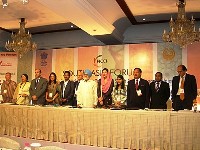By Shastri Ramachandaran*
IDN-InDepth NewsAnalysis
NEW DELHI (IDN) – India cannot be a global player unless it has peaceful relations with its neighbours. A sustained growth rate of 9% to 10% needs more than a peaceful South Asia. It calls for a new economic vibrancy in the region driven by better and more trade, business, connectivity, infrastructure, communication and transportation; and, these in a way that touch the lives of the majority in South Asia.
In his very first statement after taking office on August 1, 2011, Foreign Secretary Ranjan Mathai underscored the neighbourhood as his top priority. Fittingly, the first initiative to take form under Mathai is the South Asia Forum (SAF) with its inaugural session held in Delhi on September 8-9, 2011, which marks a decisive step towards promotion of an economic union comprising the region’s eight countries: Bangladesh, Bhutan, India, the Maldives, Nepal, Pakistan, and Sri Lanka. Afghanistan joined the organization in 2005.
The driving motive of SAF is greater and rapid economic integration through elimination of barriers that have retarded the region from realising its developmental potential. It was mooted at the 16th summit of the South Asian Association of Regional Cooperation (SAARC) in Thimphu in April 2010 to promote the idea of a South Asian Economic Union.
What is the rationale for SAF? Two realisations in the silver jubilee year of the SAARC: One, that after 25 years, SAARC was in danger of losing steam and providing no returns unless it was propelled by a new vision and mission, and a forum to drive it with a focused agenda. Two, this required a body to come up with ideas and proposals for action that directly went into the SAARC summits.
It was recognized that governments alone cannot carry out this task. Therefore, FICCI (the Federation of Indian Chambers of Commerce and Industry) was brought in, making SAF a unique public-private partnership which, as Foreign Secretary Mathai said, “explicitly includes business, academia and non-governmental entities”.
SAF would bring together leaders from government, industry, business, scholars, civil society, youth, women and media to exchange ideas on a common South Asian future and to serve as a bridge between SAARC and stakeholders outside. It is expected to deliver outcomes that can be acted upon at SAARC summits for concrete results. The Forum would meet to set the agenda before every SAARC Summit
FICCI, the Indian arm of SAARC chamber of commerce and industry, has been involved in closing the distance between the business communities of SAARC countries. It has been active in official as well as Track II engagements. Hence, it was natural for FICCI to take a leading role in this partnership for a South Asian community based on economic integration.
The least such integration needs is better and more trade, business, connectivity, infrastructure, communication and transportation; and, in a way that these meet the touch the lives of the majority in South Asia.
The first SAF meeting, with former Foreign Secretary Lalit Mansingh as Chairman, brought together the stakeholders striving to hasten regional development and integration. “The outcome is very positive. This is Track 1.5 – government plus stakeholders,” is how Mansingh summed up the two days.
Mansingh pointed out that unlike at SAARC summits, where meetings on the sidelines, especially between India and Pakistan, overshadowed the larger agenda, here SAARC issues – trade, barriers, visas – were centre-stage. Ministers and officials were present, but they also listened to what is agitating stakeholders.
“We shouldn’t make much of our South Asian identity and cultural affinity – it’s already there — but go beyond, to action on the ground such as mechanisms for implementation of projects and programmes in priority areas,” said Mansingh.
Poverty alleviation was identified as priority No.1 by Mansingh, but also other delegates, including Mahendra P Lama, Vice-chancellor of Sikkim Central University, and Sheel Kant Sharma, SAF Advisor to FICCI, who talked to me.
Lama, who was a member of the Steering Committee for SAF, said it is a unique forum designed for direct inputs to the SAARC summits. “Now we know that issues taken up will reach the SAARC Standing Committee of Foreign Secretaries and get attention at the summits,” said Lama. Hitherto there were so many lines of networking involving so many sections that one was never sure whether the output would reach the SAARC summit, he added.
Prof Lama regretted that 19 years had been squandered away by SAARC in passing resolutions instead of acting on poverty alleviation. He expected that now SAF would compel SAARC to limit itself to two or three major issues and see this through instead of taking up too many recommendations with little or no result.
Sharma, a former SAARC Secretary-General, said that SAF needs to take one big transforming step instead of small, dilatory steps as is often the case in South Asia. “That could make all the difference. SAARC has had enough declarations, reports and recommendations. Time to see some action and results that change ground conditions,” said Sharma.
SAF has started off well and the impact of this first meeting would be known in less than two months – when the SAARC summit is held in Male in November. It has been welcomed as a much-needed space though with modest expectations.
*The writer is a former Editor of Sunday Mail and has worked with leading newspapers in India and abroad. He was Senior Editor and Writer with China Daily and Global Times in Beijing. For nearly 20 years before that he was a senior editor with The Times of India and The Tribune. Besides commentaries on foreign affairs and politics, he has written books, monographs, reports and papers. He is co-editor of the book State of Nepal. [IDN-InDepthNews – September 23, 2011]
2011 IDN-InDepthNews | Analysis That Matters
Shastri Ramachandran’s previous articles on IDN:
http://www.indepthnews.info/index.php/search?searchword=Shastri&ordering=newest&searchphrase=all
Follow us on Twitter and Facebook:
http://twitter.com/InDepthNews
http://www.facebook.com/pages/IDN-InDepthNews/207395499271390?sk=wall

